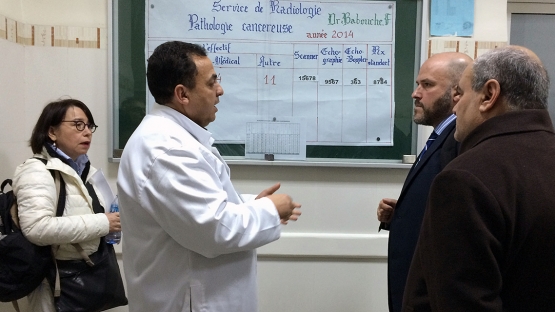An interview with Beatrix Lahoupe, Head of Programme Design of PACT, on IAEA's cancer control review mission to Algeria that took place in February 2015.
Algeria, like many other countries, is facing a rapid increase in new cancer cases. The International Agency for Research on Cancer (IARC) estimates that the number of new cases will almost double in the next 15 years, rising from 37,908 in 2012 to 67,487 in 2030. Similarly, cancer deaths are also projected to dramatically increase, reaching a total of over 40,000 by 2030.
Upon request from the Algerian Government an integrated mission of PACT or 'imPACT' review took place earlier this year. This review complemented an earlier review conducted in 2011 in Algiers and focused this time on six provinces outside the capital: Setif, Constantine, Batna, Oran, Tlemcen and Ouargla. The following interview was originally published in the WHO-Algeria's Bulletin d'informations, Trait d'Union No 9, May 2015 (in French). Ms Lahoupe talks about IAEA's Programme of Action for Cancer Therapy (PACT), the need for strategic partnerships and preliminary results of the expert mission carried out.
The IAEA, WHO and IARC regularly conducts comprehensive evaluations in countries to assess the progress made in the fight against cancer. Could you tell us more about these evaluations?
You may know that the IAEA works on cancer issues on several levels: the IAEA's Technical Cooperation Programme (for training, provision of expert advice or equipment), the Division of Human Health (for technical advice in nuclear medicine and radiation therapy) and through PACT. The mandate of PACT includes advocacy, resource mobilisation and support for the integration of radiation medicine into comprehensive national cancer control programmes.
ImPACT reviews provide a very good starting point for this endeavour. Dedicated and internationally renowned cancer experts - nominated by WHO, IARC and IAEA - assess national capacities for each element of the whole spectrum of cancer control. These areas include cancer control planning, cancer registration, prevention, early detection, diagnosis, treatment and palliative care and relevant training programmes. The findings and identified gaps provide the basis for a detailed report which includes recommendations for each of the cancer control components, tailored to the relevant country.
Cancer control should be looked at from a comprehensive perspective and within a health system strengthening approach. At the same time, no single organisation can bring all the expertise required to address such a complex issue as cancer control. PACT strongly believes in an overarching and strategic partnership approach with regard to its work. We are therefore very pleased about the ongoing cooperation with WHO and IARC and ready to deepen and expand it further.
This is the second imPACT mission which IAEA and WHO conducted in Algeria, the first taking place in 2011. What progress did you notice and what challenges remain to be solved?
Indeed, a first imPACT review took place in 2011. At that time, the mission focused on cancer care centres in Algiers. The experts then also looked at an early draft of a national cancer control plan and advised on aligning the future plan to WHO guidelines for cancer control planning.
The second mission compliments the first one, in that it concentrated on areas outside the capital, namely in 6 'wilayas' or provinces in the East, West and South of the country. The experts visited cancer care centres, hospitals, and laboratories, speaking with doctors, nurses and technicians at different levels of care about their work.
Along with the WHO country office, the experts also had the opportunity to have a first look at Algeria's new cancer control plan 2015-2019. Former Minister of Health, Professor Zitouni, who has been appointed as the national focal point for cancer by the Algerian President and who led the development of the National Cancer Plan, told us the history of this ambitious project and how it has evolved. We then discussed with senior officials in the Ministry of Health about detailed strategies for this plan to become a reality.
The mission acknowledged the country's enormous efforts and the impressive commitment and progress made in combatting cancer. This is evidenced by the activities foreseen under the national plan but also by the new cancer care centres that are being established.
The mission identified a number of remaining challenges with potential means to address them and recommended prospective partners to accompany Algeria in these efforts. A detailed report will be submitted to the Minister of Health, following which the IAEA, WHO, IARC and other partners stand ready to support Algeria in realising their vision to fight cancer.


